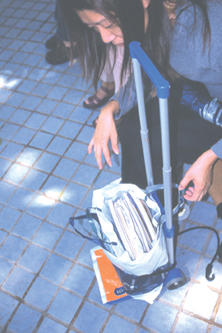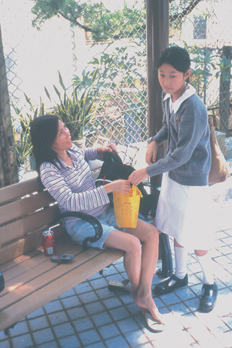Other stories on Social issues: South Asia Students have difficulties learning Chinese More money needed to improve urban hygiene |
Lenient parenting
Are children over-protected?


Right: Domestic helper brings meal to child. Left: During lunchtime, parents bring books that the children need to the school, so that children can carry less. (Barry Wu)
By Barry Wu
Sparing the rod on children seems to be creating problems for both individuals as well as the society in Hong Kong, claim local social workers.
Yip Chan On Nar, assistant social work officer for Dr. Caritas & Mrs. Olinto De Sousa Family Service (Sha Tin), said, “Parents are treating their children leniently because of different reasons.
“Firstly, most of them were treated harshly by their own parents. They had to obey their parents absolutely or would be hit. Parents today do not want their children to experience what they suffered.
“Secondly, with the influx of Western ideas in 1950s and 1960s, parents find that it may not be necessary to discipline their children harshly.
“Thirdly, the atmosphere of society has changed. Couples are having fewer children. Parents are spending more resources and time on each child.”
Fifteen-year-old Liu Chi Chung, or Ah-Chung, is a Form 2 student at Valtorta College. His parents have handled him with kid gloves since childhood.
This may be a direct result of his mother’s past experiences. Ah-Chung’s mother, Liu Lo Siu King, said, “My parents did not pay much attention to me.
“I started to do housework when I was 7. I do not want my son to do that.”
Ah-Chung is the youngest child and has an elder sister, Fung Ching, who is in Form 6 at the Hong Kong Taoist Association Yuen Yuen No. 2 Secondary School.
She said she witnesses her parents’ leniency toward Ah-Chung.
Her brother seldom performs household chores and is very reliant on his mother. For example, he could not tie his shoelaces until Primary 5 or 6.
“Ah-Chung does not know how to cook. And he wants me to accompany him when he goes to the doctor or hair salon,” said Fung Ching.
According to Mrs. Yip of the family service, many children growing up in this kind of environment are not given the chance to be independent.
“In some cases, even after the children get married, they still do not know how to take care of themselves,” Mrs. Yip said.
Said Fung Ching: “In fact, my brother is quite lazy and he is not doing well at school.
“My parents want to use material goods to lure him to do better; therefore, my brother readily asks for pocket money.”
Mrs. Yip said that many parents tend to give money to their children as a compensation for the limited time they spend with them.
She added that this unhealthy practice may make children materialistic or aggressive.
“At the same time, many parents are busy with their work, so they ask their domestic helpers or relatives to take care of their children,” said she.
Nelia Adeser, a Filipino domestic helper who has worked in Hong Kong for 4 years, takes care of 13-year-old Lai Hei In. She waits outside Hei In’s school at the lunch hour every day to provide meals.
Ms. Adeser said Hei In’s parents are very busy and often work overnight.
She said that it is really hard to decide on the best way to discipline Hei In.
“I do not know if the way I discipline her is appropriate or not,” said she.
“So I tend not to discipline her.”
Another problem of permissive parenting is a child’s lack of incentive to study and work hard.
Fung Ching said, “My brother thinks that my parents will take care of him forever, so he does not need to work hard at school.”
“I love only soccer,” Ah-Chung said. “I repeated Form 1 and I am now repeating Form 2, but I do not care.”
Mrs. Yip warned that this negative attitude affects not only him, but also society as well.
“In receiving excessive care from their parents, young adults often do not have their own prospects of life. They do not have the motivation to work,” said her.
She added, “Many young graduates don’t have a job and don’t bother to search for one because they can still get pocket money from their parents.”
Mrs. Yip said that if the population of unemployed young adults increases, there will be a gradual decrease in productivity in society.
When their parents get older, this dependent population will increase and, in turn, place a burden on society.
Mrs. Yip emphasized that selecting an “appropriate way” of parenting from the onset of their child’s life is important.
“Parents should not be too lenient on their children,” she said. “Children may pick up the habit of being taken care of, and this habit is hard to remove.”
According to Mrs. Yip, parents who have chosen an “inappropriate” way must let their children learn the hard way.
“So they can realize they have to overcome difficulties on their own.
“As a result, their ability to take care of themselves can be improved,” she said.
Parents should also encourage their children to find jobs by reducing the amount of pocket money gradually.
In that way, a child will learn the importance and value of money and will grow up to be a responsible adult.